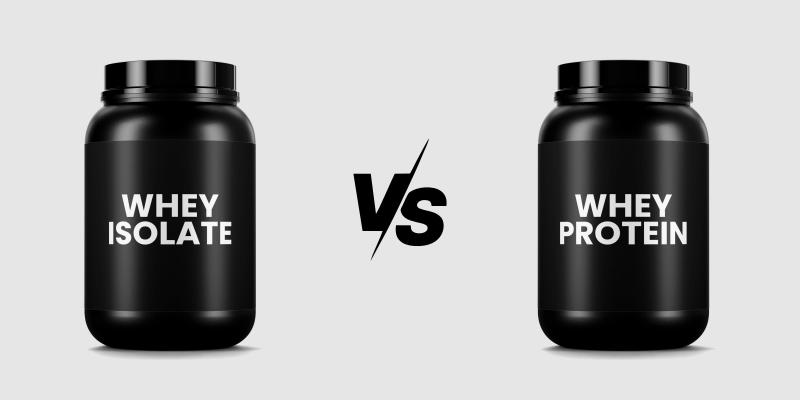Which Protein Should You Choose: Protein Isolate or Whey Protein?

Protein is an essential part of a healthy diet, especially for those looking to build muscle, lose weight, or maintain overall wellness. Among the most popular protein supplements are whey protein powder and whey isolate protein powder. While they are both derived from milk, they have key differences that make them suitable for different goals. In this article, we will explore whey isolate protein vs. whey protein powder, their benefits, and which one may be best for you.
What is Whey Protein?
A premium whey protein obtained from milk during the cheese-making process is whey protein. It contains all nine essential amino acids, hence it is a complete protein. There are three main types of whey protein:
Whey Protein Concentrate (WPC): A mixture of 70–80% protein with a small amount of fat and lactose.
Whey Protein Isolate (WPI): Contains 90% or more protein with minimal lactose and fat.
Whey Protein Hydrolysate (WPH): For quicker absorption, it is predigested.
Whey protein is widely used for muscle recovery, weight management, and overall health benefits.
What is Whey Isolate Protein?
Whey isolate protein powder is a more refined version of whey protein. It goes through additional processing to remove more fats, carbohydrates, and lactose, resulting in a purer form of protein. This makes it an excellent choice for those who need a high-protein, low-carb option.
Differences Between Whey Protein and Whey Isolate Protein
1. Protein Content
Whey protein powder typically contains 70-80% protein.
Whey isolate protein powder contains 90% or more protein, making it a more concentrated protein source.
2. Fat and Lactose Content
Whey protein contains some fat and lactose, which may not be suitable for lactose-intolerant individuals.
Whey isolate protein has most of the fat and lactose removed, making it a better choice for those with lactose sensitivity.
3. Absorption Rate
Whey isolate protein is absorbed faster due to its refined nature.
Whey protein powder has a slower digestion rate because of its fat and carbohydrate content, providing a sustained release of amino acids.
4. Calories and Carbohydrates
Whey isolate protein is lower in calories and carbohydrates, making it a great option for weight loss.
Whey protein powder contains slightly more calories and carbs, which can be beneficial for those looking to gain muscle mass.
5. Cost
Whey isolate protein powder is generally more expensive due to the additional processing involved.
Whey protein powder is more budget-friendly while still providing great benefits.
Which One is Better for You?
For Weight Loss:
If you are trying to lose weight, whey isolate protein is the better option. Its high protein content and low fat and carbohydrate levels make it ideal for supporting fat loss while preserving lean muscle.
For Muscle Building:
Both whey protein powder and whey isolate protein can help build muscle. However, whey protein powder is slightly better for muscle gain due to its calorie and carbohydrate content, which provides extra energy for intense workouts.
For Lactose-Intolerant Individuals:
If you are lactose intolerant or sensitive to dairy, whey isolate protein powder is the better choice because it contains minimal lactose.
For Budget-Conscious Consumers:
If you are looking for an affordable protein supplement, whey protein powder is a great choice. It still provides high-quality protein at a lower cost compared to whey isolate protein.
Benefits of Whey Protein and Whey Isolate Protein
1. Muscle Recovery and Growth
Both whey protein and whey isolate protein powder provide essential amino acids that help repair and build muscles after exercise.
2. Supports Weight Loss
High-protein diets can reduce hunger and boost metabolism. Whey isolate protein is especially helpful for weight loss due to its low-calorie content.
3. Improves Immune Function
Whey protein contains immunoglobulins that support the immune system and help the body fight infections.
4. Enhances Workout Performance
Protein supplementation helps maintain muscle mass and improves endurance, making workouts more effective.
How to Use Whey Protein and Whey Isolate Protein
Post-Workout Shake: Mix a scoop with water or milk for fast recovery after a workout.
Meal Replacement: Use it as a meal replacement by blending it with fruits and nuts.
Snack Alternative: Have a protein shake instead of unhealthy snacks to stay full longer.
Cooking and Baking: Add whey protein to pancakes, oatmeal, or protein bars.
Conclusion
Both whey protein powder and whey isolate protein powder are excellent sources of protein, but they serve different purposes. If you want a higher protein content with minimal lactose and fat, whey isolate protein is the better choice. If you prefer a more budget-friendly option with slightly more calories and carbohydrates, whey protein powder is a great alternative.
Your choice depends on your health goals, dietary needs, and budget. Regardless of which one you choose, adding whey protein to your diet can help you achieve better fitness results and overall well-being.
FAQs
1. Can I use whey isolate protein for muscle gain?
Yes, whey isolate protein supports muscle growth and recovery, just like regular whey protein.
2. Is whey isolate protein lactose-free?
Whey isolate protein contains very little lactose, making it suitable for lactose-sensitive individuals.
3. Can I use whey protein powder for weight loss?
Yes, but whey isolate protein powder is a better choice due to its lower fat and carbohydrate content.
4. Which is better for beginners: whey protein or whey isolate?
Beginners can start with whey protein powder as it is more affordable and still offers great benefits.
5. Can I take both whey protein and whey isolate protein?
Yes, you can use both based on your needs. For example, you can use whey protein powder for meals and whey isolate protein for post-workout recovery.
By understanding the differences between whey protein powder and whey isolate protein, you can make the best choice for your health and fitness goals!
Post Your Ad Here
Comments